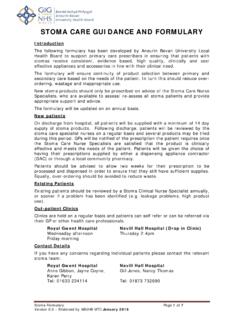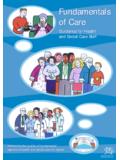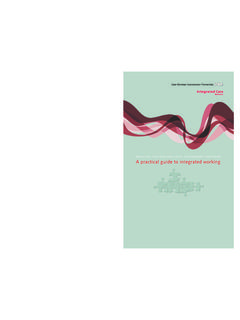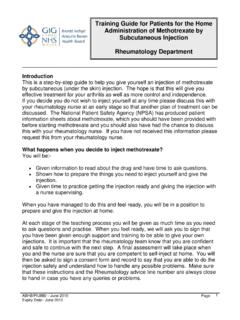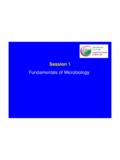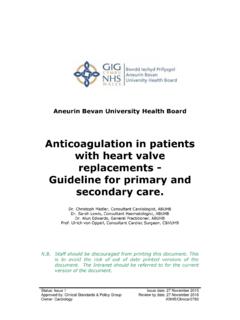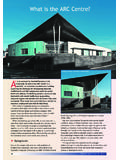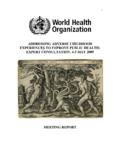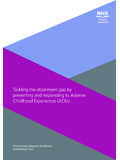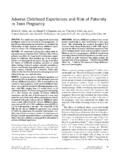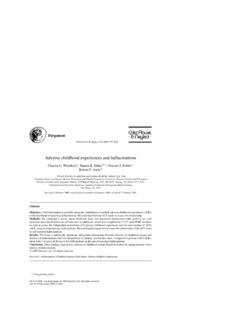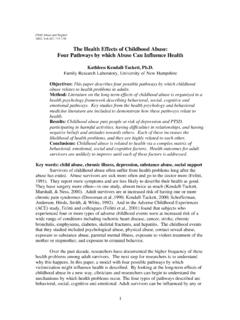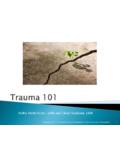Transcription of Adverse Childhood Experiences - NHS Wales
1 Adverse Childhood Experiences and their association with chronic disease and health service use in the Welsh adult populationWelsh Adverse Childhood Experiences (ACE) study This is the third in a series of reports examining the prevalence of Adverse Childhood Experiences (ACEs) in the Welsh adult population and their impact on health and well-being across the life course. The series includes: The prevalence of Adverse Childhood Experiences and their association with health-harming behaviours in the Welsh adult population. The impact of Adverse Childhood Experiences on mental well-being in Welsh adults. The impact of Adverse Childhood Experiences on chronic disease and the use of health services in Welsh adults. PrefaceOver 2,000 adults aged 18-69 years participated in the ACE study for Wales , providing anonymous information on their exposure to ACEs before the age of 18 years and their health and lifestyles as adults.
2 The study achieved a compliance rate of and the sample was designed to be representative of the general population in Wales . Data were collected through face to face interviews in participants places of residence using an established questionnaire incorporating the short ACE tool developed by the US Centers for Disease Control and Prevention and based on work by Felitti et al [1].ISBN 978-1-910768-38-9 2016 Public Health Wales NHS contained in this document may be reproduced under the terms of the Open Government Licence (OGL) provided it is done so accurately and is not used in a misleading to Public Health Wales NHS Trust to be in the typographical arrangement, design and layout belongs to Public Health Wales NHS Trust. Kathryn Ashton, Mark A. Bellis, Alisha R. Davies, Katie Hardcastle and Karen HughesAdverse Childhood Experiences and their association with chronic disease and health service use in the Welsh adult populationPolicy, Research and International Development Directorate Floor 5, Public Health Wales NHS Trust Number 2 Capital Quarter Tyndall Street, Cardiff CF10 4 BZTel: +44 (0)29 2010 4460 Welsh Adverse Childhood Experiences (ACE) StudyAcknowledgementsWe are grateful to the residents of Wales who kindly participated in the survey.
3 We would like to thank Future Focus Research for carrying out the data collection, Jenney Creative for the design of the report and Helen Lowey (Blackburn with Darwen Borough Council) and Dinesh Sethi (World Health Organization) for reviewing the content of the report. Finally, we are grateful to all colleagues from Public Health Wales and Liverpool John Moores University who supported the development of the study and/or final report Adverse Childhood Experiences (ACEs) have harmful impacts on health and well-being across the life course. The Welsh ACE study measured exposure to nine ACEs in the Welsh populationand their association with chronic disease development and health service use in Childhood Experiences ,chronic disease and health service use in WalesOver a 12 month period, compared to people with no ACEs,those with four or more ACEs were:Levels of health service use were higher in adults who experienced more ACEs*# Up to the age of 69 years, those with four or more ACEs were 2x more likely than those with no ACEs to be diagnosed with a chronic disease*$For specific diseases they were.
4 More likely to developDiabetes (Type 2)more likely to developHeart Diseasemore likely to develop aRespiratory Disease2x3x3xmore likely to havefrequently visited a GP**more likely to haveattended A&EThe Welsh ACE survey interviewed approximately 2000 people (aged 18-69 years) from across Wales at their homes in 2015. Of those eligible to participate, just under half agreed to take part and we are grateful to all those who freely gave their time. Information in this info-graphic is taken from the third report on the Welsh ACE survey: Adverse Childhood Experiences and their association with Chronic Disease and Health Service Use in the Welsh adult population. This report and previous reports using the Welsh ACE survey data can be accessed on the Public Health Wales , Research and International Development Directorate, Floor 5, Public Health Wales NHS Trust, Number 2 Capital Quarter, Tyndall Street, Cardiff, CF10 4BZ.
5 Tel: +44(0)2920 104460 November 2016*After taking age, sex, ethnicity and residential deprivation into account. All data was self-reported.; $Includes Type 2 Diabetes, Stroke, Cancer, Coronary Heart Disease, Liver or Digestive Disease and Respiratory Disease; #Excluding reasons relating to pregnancy; **Visited a GP six or more times over the past 12 months. more likely to have stayedovernight in hospitalHA&E4x3x3x53%47% of adults in Wales suffered at least one ACE as a childand 14% suffered four or more0 ACEs1 ACE2-3 ACEs4+ ACEs20%13%14%Verbal abusePhysical abuseSexual abuseParental separationHousehold domestic violenceHousehold mental illnessHousehold alcohol abuseHousehold drug useHousehold member incarcerated23%17%10%20%16%14%14%5%5%Pro portion of Welsh adults suffering each ACE66 Preventing ACEs in future generations could reduce levels of:Compared with people with no ACEs, those with 4+ ACEs are.
6 Heroin/crack cocaineuse (lifetime)by 66%Incarceration (lifetime)by 65%Violence perpetration (past year)by 60%Violence victimisation (past year)by 57%Cannabis use (lifetime)by 42%Unintended teen pregnancyby 41%High-risk drinking(current)by 35%Early sex (before age 16)by 31%Smoking tobacco or e-cigarettes (current)by 24%Poor diet(current; <2 fruit & veg portions daily)by 16%ACEs increase individuals risks of developing health-harming behavioursThe national survey of Adverse Childhood Experiences in Wales interviewed approximately 2000 people (aged 18-69 years) from across Wales at their homes in 2015. Of those eligible to participate, just under half agreed to take part and we are grateful to all those who freely gave their time. 20161514116664times more likely to be a high-risk drinkertimes more likely to have had or caused unintended teenage pregnancytimes more likely to smoke e-cigarettes or tobaccotimes more likely to have had sex under the age of 16 yearstimes more likely to have smoked cannabistimes more likely to have been a victim of violence over the last 12 monthstimes more likely to have committed violence against another person in the last 12 monthstimes more likely to have used crack cocaine or herointimes more likely to have been incarcerated at any point in their lifetime*After taking age, sex, ethnicity and residential deprivation into account.
7 All data was self-reported.; $Includes Type 2 Diabetes, Stroke, Cancer, Coronary Heart Disease, Liver or Digestive Disease and Respiratory Disease; #Excluding reasons relating to pregnancy; **Visited a GP six or more times over the past 12 months. Public Health Wales2 Evidence from Wales and internationally has demonstrated a strong and cumulative association between exposure to adversity during Childhood , and the adoption of health-harming behaviours and poor mental health across the life course [1-4]. Early life trauma from ACEs does not only expose children to immediate harm (for example, injury resulting from physical abuse) but has also been associated with changes in Childhood neurological, immunological and hormonal development [5-6] which have detrimental effects on health across the life course. Prolonged exposure to Childhood stressors can result in children becoming locked into a higher state of alert to threat; physiologically adapted to short-term survival as they become permanently prepared to respond to further trauma.
8 Such adaptation also increases tissue inflammation and long-term wear and tear on the body [6]. In addition, ACEs in Childhood can compromise how children learn to regulate their emotions, control their impulses or manage their behaviour [7]. Reduced self-control and difficulty with social interactions increase individuals vulnerability to engaging in health-harming behaviours, such as alcohol, tobacco and drug use, which are often adopted as coping mechanisms [3-4]. The uptake of such behaviours, as well as the physiological changes resulting directly from chronic Childhood trauma, increase the risk of individuals developing non-communicable diseases (NCDs) such as cancer and heart disease earlier in life [8-9], and can ultimately result in premature mortality [10] (Figure 1).Children who are exposed to adversity are also more likely to have problems developing secure attachments with others, which can threaten their self-image or sense of self worth [11].
9 Consequently, experiencing ACEs can have a long-term impact on mental health, increasing the risk of depression, anxiety and psychosis [12-13], and having a negative impact on general mental well-being [14]. Lower mental well-being is itself associated with health-harming behaviours and increased risk of poor health and NCDs [12]. In addition, individuals exposed to ACEs are likely to have low self-control which can lead to increased levels of violence perpetration and victimisation in later life [12].International and national evidence also suggests there are associations between exposure to ACEs and health care use including visits to doctors, surgeries, hospitalisations and higher annual healthcare costs in adulthood [8,15-18]. Increased use of health care services amongst those who have experienced adversity in Childhood may be a direct result of poor physical health, but also a consequence of poor mental health [19] or perceived health needs [20].
10 Individuals who have been exposed to ACEs have been shown to hold more negative perceptions of their own general health, suggesting they may perceive a greater need for health care intervention irrespective of actual ill health [21].Introduction Adverse Childhood Experiences (ACEs) are stressful events occurring in Childhood such as being a victim of neglect and child abuse (physical, sexual and/or emotional) or growing up in a household in which there are adults experiencing alcohol and drug use problems, mental health conditions, domestic violence or criminal behaviour resulting in incarceration. Welsh Adverse Childhood Experiences (ACE) Study3 DEATHE arly deathNon communicable disease, disability, social problems, low productivityAdopt health-harming behaviours and crimeSocial, emotional learning problemsDisrupted physiological developmentACEsBIRTHD eveloped from Felitti et al.
